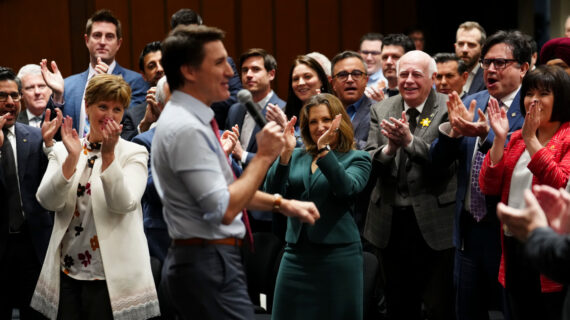When the Liberal government came to power in 2015, we were told it would be taking a feminist approach to developing policy across government, applying a gender equity lens to everything from international aid to economic development.
Despite the lack of transparency, or any clear policy outcomes, it is not hard to guess how the government assesses gender equity nor is it hard to imagine their policy prescription.
For progressives, the labour force participation of women is never high enough and the commitment to universal, government-run childcare is never strong enough. This dated, top-down approach to gender equality leaves no room for the complexities of 21st century womanhood and does not even begin to factor in the real wants and needs of Canadian families.
As liberal solutions come up short, conservatives have the opportunity to articulate our own feminism informed by choice, dignity and the pursuit of a good life.
There is no doubt that sexism, although greatly diminished in Canada over the last number of decades, has left a stubborn gender inequality in its wake. The COVID-19 pandemic has further exposed the weaknesses in our ham-fisted approach to date, leaving us struggling to understand why a crisis can send us back in time so easily. Women with children are opting out of the workforce in droves, women without children are delaying having them despite a desire to start and grow families and women in care-giving and other essential service settings are struggling to take care of society’s most vulnerable on wages which can barely support their own families. These challenges persist despite Canada having some of the most generous leave policies in the world, access to childcare (subsidized for low-income people and universal in Quebec) and despite a gender equity lens being applied to every decision the federal government makes.
The first thing a conservative feminism should do is drop labour-force participation as the only measure of gender equality. Conservatives understand that the goal of all women is not necessarily full-time, constant paid employment, nor is that arrangement necessarily the best for a given family.
Ironically, some of the government’s own policies belie the liberal view that all-parents-working-all-the-time is the best possible policy outcome. Parental leave in Canada is generous. It can be taken for up to eighteen months and split between parents, which implies supporting parents to be home with newborn babies is a social good that extends well beyond the physical needs of the first few weeks after birth or adoption. There is no switch that flips at eighteen months, converting a woman from a caregiver back into a GDP-contributor. Just as there is no switch that turns a woman’s curious brain off when she gives birth. Public policy should enable women to benefit from the dignity of work and the dignity of motherhood, leaning into one or the other as they see fit.
Just as pursuing a fulfilling career is central to a good life, building a family is at the core of what it means to be a happy human
Taken to its extreme, policy driven by labour force participation as its key measure of success discourages parents from having children in the first place and if they do, discourages women from choosing to stay home for longer than eighteen months. It should be obvious why this is an impractical and amoral approach to policy making but the frequency with which some thought leaders cite the statistic makes it clear the downsides need to be explained.
First, our country’s economic health relies on our population maintaining itself or growing. Even the most aggressive immigration policy will not supply and integrate enough young people fast enough to support our aging population, unless Canadians themselves also have more children.
Second, and far more important, women want to have kids and they want to have more of them. Just as pursuing a fulfilling career is central to a good life, building a family (nuclear or otherwise) is at the core of what it means to be a happy human.
The next thing a conservative feminism should do is recognize the value of care, including unpaid care. Despite efforts to drive up labour force participation, families continue to have children (and aging grandparents) who require care. Reluctantly accepting the conundrum of this inconvenience but wanting to keep as many women working as much as possible, liberal feminism pivots to the one and only solution it can conceive of: government-funded and managed childcare. As the logic goes, when the flip switches at eighteen months and women convert back into GDP-contributors, they can leave their children in a government-run childcare centre and go back to work full time. This is particularly convenient for white collar professional women who can further enhance their family income while transferring the burden of care to lower-paid workers.
Conservative feminism should reject this narrow solution because it removes the element of choice, often to the benefit of wealthy women and the detriment of low-income women and their families. If the cost of childcare was returned to parents in the form of tax cuts or direct transfers, and they were empowered to make more desirable choices through income-splitting-enabling tax policy, a childcare worker may choose to opt out of the labour force for a period of time and stay home with her own children, a choice that would apparently stun some policy makers. Unpaid caregiving, the choice and duty of many, is a crucial component of the success not only of our economy but of our society and a conservative feminist public policy should reflect that.
Finally, a conservative feminism should recognize the role that culture plays in matters of gender equality. It should acknowledge the role that communities play in raising honourable men – and the role men play in gender equality. It should confront cultural myths that negatively influence women pursuing their goals like the social expectation of an expensive wedding many cannot afford and therefore delay, or the unscientific but popular view that women can delay childbearing by many years without consequence. It would take the advice of many successful female leaders who say the number one factor in their success was the man they chose to marry. Liberals prefer not to acknowledge the impact of culture and community on social outcomes because those problems can rarely be addressed by government-funded and managed programs like universal childcare. No federal gender equity lens applied to a federal budget will empower a woman to insist that when a global pandemic strikes, her husband be the one to pause his career and stay home with the kids.
These persistent challenges to gender equality must be addressed. A conservative feminism should support and nurture the community institutions that form our moral character, understanding that top-down national programs are no match for persistent cultural influences.
As liberal feminism fails to meet the challenges faced by Canadian women today, conservatives have the opportunity to articulate our own feminism, one which treats women and our families not as economic units from which to extract the highest possible economic output and efficiency, but as community members, spouses, mothers, daughters, workers, employers and volunteers. Feminism should seek to understand what it is that women want and need to exercise their personal freedoms and ambitions as well as nurture their contributions to strong families, strong communities and a strong country.




